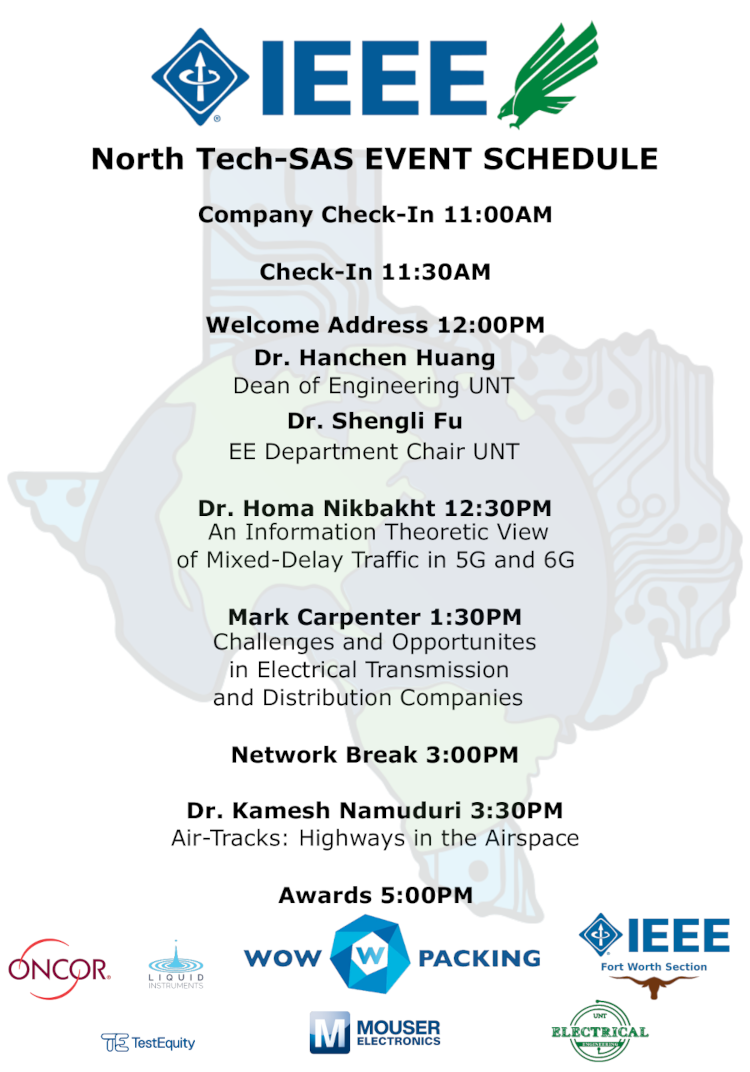IEEE North Tech-SAS Summit 2022

The IEEE North Tech-SAS (Students Advancing Society) Summit, the flagship event of the IEEE UNT Student Branch and IEEE-HKN Lambda Zeta chapter, brings together students and professionals to showcase their works amongst peers and colleagues, while fostering creativity and inspiration.
The final event of North Tech-SAS has been rescheduled for April 16 (due to the storm in February). Register for a chance to win prizes! Check-in begins at 11:30 AM.
Speakers include Dr. Homa Nikbakht, IEEE Fellow Mark Carpenter, and IEEE VTS Distinguished Lecturer Dr. Kamesh Namuduri, as well as an opening session with Dean Hanchen Huang and Chair Shengli Fu.
Date and Time
Location
Hosts
Registration
-
 Add Event to Calendar
Add Event to Calendar
Speakers
Mr. Mark Carpenter, IEEE Fellow
Challenges and opportunities in electrical transmission and distribution companies
This talk will cover a wide variety of challenges and opportunities that occur at Oncor. The talk will be divided into 3 or 4 parts. Part 1 will cover the response to 2021 storm Uri. Part 2 will cover Oncor’s approach to analytics. Part 3 will be a short description of the type of technical based careers at Oncor. If time allows, Part 4 will cover some career tips that have been learned over time .
Biography:
Mark Carpenter is Sr. Vice President of Transmission & Distribution Operations at Oncor where he has spent his entire career. Over Mark’s 47 year career, he has held various field management and engineering management positions in the transmission and distribution of electrical energy. Previous assignments also include Vice President-Chief Information Officer, Vice President-Chief Technology Officer, Director of Engineering, and Director of System Protection. Throughout his career, he has focused on developing people and creating high performance teams.
Mark earned a bachelor’s degree in electrical engineering at Texas Tech in 1975 and is active in professional activities. He is an IEEE Fellow, an honorary member of the IEEE Power System Relaying Committee, a member of the IEEE/PES Industrial Advisory Council, a member of the Texas Society of Professional Engineers. He is a registered Professional Engineer in the State of Texas and is on the Dean of Engineering Council at Texas Tech. In 2021 he received the IEEE PES Leadership in Power award.
He is also active in the community as demonstrated by his involvement with the Chinese Institute of Engineers DFW Chapter and as President of Family Promise of Irving, a non-profit organization that assists homeless family regain their foothold by providing safe housing and developmental opportunities in conjunction with a network of churches in Irving. He is active in his church and is married with five kids, four daughters-in-law, and ten grandkids.
Dr. Kamesh Namuduri
Air-Tracks: Highways in the Airspace
In this presentation, Professor Kamesh Namuduri will discuss a brand-new project that UNT is leading to design the very first air track for unmanned air transportation in the Nation. This project serves as one of the best examples of private-public-community-government partnership. Collaborating with the aviation and telecommunication companies across the country, UNT is working towards the design of the air-track concept that forms the foundation for the future of advanced air mobility. As part of this presentation, Professor Namuduri will discuss several technical details of this ambitious project including strategic deconfliction / conflict management between aerial vehicles, vehicle-to-vehicle communications, and related standards along with real-world examples. This presentation also highlights the importance of community engagement in this project.
Biography:
Kamesh Namuduri is a Professor of Electrical Engineering and the director of Autonomous Systems Laboratory at the University of North Texas (UNT). He received his B.S. degree in Electronics and Communication Engineering from Osmania University, India, in 1984, M.S. degree in Computer Science from University of Hyderabad in 1986, and Ph.D. degree in Computer Science and Engineering from University of South Florida in 1992. Over the past eleven years, his research is focused on aerial networking and communications. He is serving as the chair for two Standards Working Groups (IEEE 1920.1: Aerial Communications and Networking and IEEE P1920.2: Vehicle-to-Vehicle Communications for Unmanned Aircraft Systems). Namuduri is named as a “Distinguished Lecturer” by the IEEE Vehicular Technology Society for the term 2021-2023.
H e is serving as the Chair for the IEEE Vehicular Technology Society’s Ad Hoc Committee on Drones, as the Vice Chair for “Aerial Communications”, an emerging technology initiative of the IEEE Communication Society, and as an Expert Adviser on UAVs, COM/Access Core Standards Committee, IEEE Communications Society. He is a co-editor for the book titled “UAV Networks and Communications” published by the Cambridge University Press in 2017. He is leading the Smart and Connected Community project on “Deployable Communication Systems” in collaboration with the government, public, and private organizations. This living laboratory project was demonstrated thrice during the Global City Teams Challenge hosted jointly by the National Institute of Standards and Technology and US Ignite in 2015, 2016, 2017, and 2018. He contributed to the development of research agenda, requirements and blueprints highly deployable communications systems led by the National Institute of Standards and Technology and National Public Safety Telecommunications Council. In 2020, Namuduri successfully led a team of seven organizations including three universities and four private companies engaging as an airspace partner in the Advanced Air Mobility, National Campaign Developmental Test project directed by NASA. During 2022-2023, he has been leading the North Texas Cohort engaging as an infrastructure partner in the AAM National Campaign directed by NASA. This team will be conducting several flight tests in the near future aimed at understanding the challenges when UAVs are deployed at scale in real-world.
